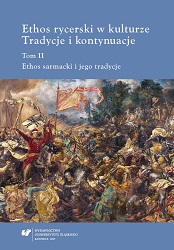Rycerz chrześcijański wobec zjawiska niewoli tatarsko‑tureckiej. Na podstawie
wybranych utworów staropolskich
The Christian Knight in Regard to Tatar‑Turkish Captivity. Based on Selected Works of Old Polish Literature
Author(s): Renata Rybarczyk
Subject(s): History, Language and Literature Studies, Literary Texts, Studies of Literature, Philology
Published by: Wydawnictwo Uniwersytetu Śląskiego
Keywords: Tatar‑Turkish captivity; knight‑liberator; John III Sobieski
Summary/Abstract: The author of the following paper deals with the works of Old Polish literature onthe Tatar‑Turkish subject matter, in particular the threat posed by the Tatar‑Turkishopponent to the freedom of countries and peoples as well as individuals. Their authors werewarning against the possible enslavement of the people and the loss of sovereignty by theCommonwealth. Defending national independence was regarded as a knightly duty. Anobligation of a knight was also to free his countrymen and coreligionists from Tatar‑Turkishcaptivity.The author of this article also brings to attention the works which regard the knightswho free captives as role models. Individual accomplishments of the liberators of captiveswere frequently and readily described in classical Polish literature. John III Sobieski wasfamed for this when he was still a head commander, as we can see in the works of SamuelLeszczyński, Remigiusz Suszycki and Jan Ślizień. This article demonstrates, on selected examples, that the defense of freedom against the Tatar‑Turkish opponent had a significantplace in the Old Polish chivalric ethos.
Book: Ethos rycerski w kulturze. Tradycje i kontynuacje. T. II: Ethos sarmacki i jego tradycje
- Page Range: 100-113
- Page Count: 14
- Publication Year: 2017
- Language: Polish
- Content File-PDF

